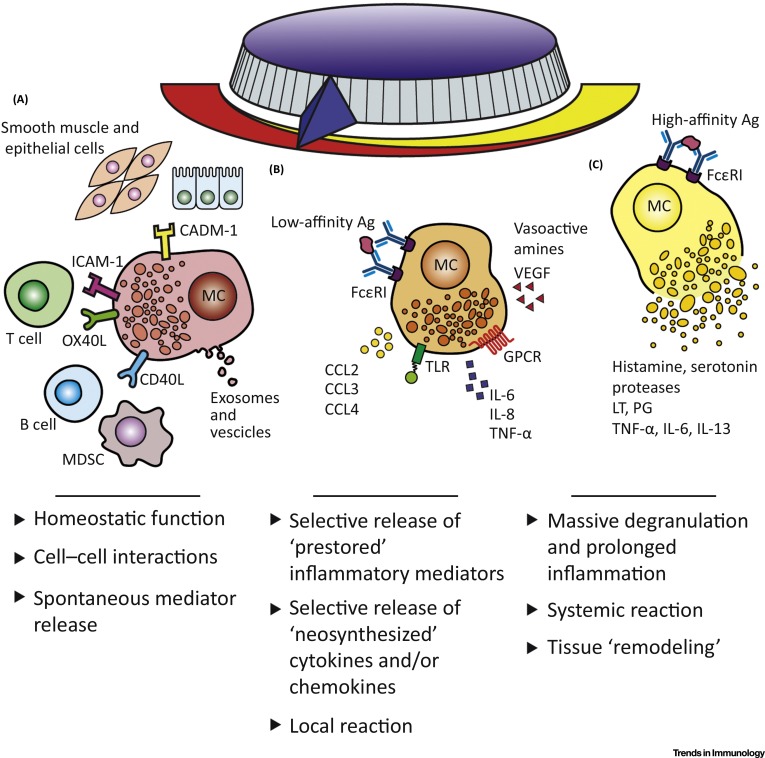当前位置:
X-MOL 学术
›
Trends Immunol.
›
论文详情
Our official English website, www.x-mol.net, welcomes your
feedback! (Note: you will need to create a separate account there.)
Rheostatic Functions of Mast Cells in the Control of Innate and Adaptive Immune Responses
Trends in Immunology ( IF 13.1 ) Pub Date : 2017-04-24 00:00:00 , DOI: 10.1016/j.it.2017.04.001 Barbara Frossi , Francesca Mion , Claudio Tripodo , Mario P. Colombo , Carlo E. Pucillo
Trends in Immunology ( IF 13.1 ) Pub Date : 2017-04-24 00:00:00 , DOI: 10.1016/j.it.2017.04.001 Barbara Frossi , Francesca Mion , Claudio Tripodo , Mario P. Colombo , Carlo E. Pucillo

|
Mast cells are evolutionarily ancient cells, endowed with a unique developmental, phenotypic, and functional plasticity. They are resident cells that participate in tissue homeostasis by constantly sampling the microenvironment. As a result of their large repertoire of receptors, they can respond to multiple stimuli and selectively release different types and amounts of mediator. Here, we present and discuss the recent mast cell literature, focusing on studies that demonstrate that mast cells are more than a switch that is turned ‘off’ when in the resting state and ‘on’ when in the degranulating state. We propose a new vision of mast cells in which, by operating in a ‘rheostatic’ manner, these cells finely modulate not only immune responses, but also the pathogenesis of several inflammatory disorders, including infection, autoimmunity, and cancer.
中文翻译:

肥大细胞在固有和适应性免疫反应控制中的止变功能。
肥大细胞是进化上古老的细胞,具有独特的发育,表型和功能可塑性。它们是通过不断采样微环境而参与组织动态平衡的驻留细胞。由于它们具有大量的受体,它们可以对多种刺激作出反应,并选择性释放不同类型和数量的介体。在这里,我们介绍并讨论最新的肥大细胞文献,重点研究表明肥大细胞不仅仅是处于静止状态时处于“关闭”状态而处于脱颗粒状态时处于“开启”状态的开关。我们提出了一种肥大细胞的新视野,其中的肥大细胞通过“变阻性”操作,不仅可以很好地调节免疫反应,还可以很好地调节几种炎症性疾病的发病机理,包括感染,自身免疫和癌症。
更新日期:2017-08-31
中文翻译:

肥大细胞在固有和适应性免疫反应控制中的止变功能。
肥大细胞是进化上古老的细胞,具有独特的发育,表型和功能可塑性。它们是通过不断采样微环境而参与组织动态平衡的驻留细胞。由于它们具有大量的受体,它们可以对多种刺激作出反应,并选择性释放不同类型和数量的介体。在这里,我们介绍并讨论最新的肥大细胞文献,重点研究表明肥大细胞不仅仅是处于静止状态时处于“关闭”状态而处于脱颗粒状态时处于“开启”状态的开关。我们提出了一种肥大细胞的新视野,其中的肥大细胞通过“变阻性”操作,不仅可以很好地调节免疫反应,还可以很好地调节几种炎症性疾病的发病机理,包括感染,自身免疫和癌症。































 京公网安备 11010802027423号
京公网安备 11010802027423号